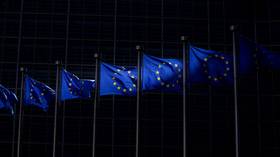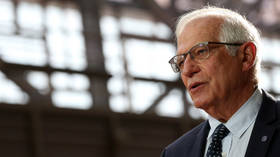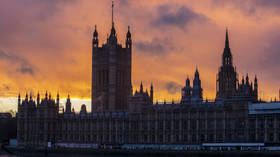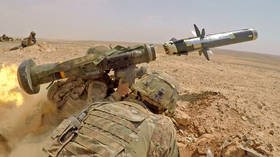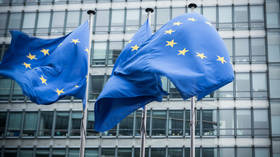How the latest Ukraine escalation split the EU
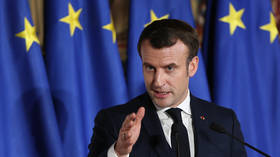
Concerns over a purported Russian "invasion" of Ukraine have been growing in the West, with the US/UK media machine in overdrive. "Experts" keep talking about the country’s “increasing military buildup” along its western borders and, every month, they post almost identical images from American satellites.
The Western press is painting a vivid picture of Moscow’s plan to “attack from three directions,” while politicians refer to some intelligence reports that describe mysterious movements of 100,000 troops.
War without War
“If Russia keeps getting away with what they’re doing in Ukraine and trying to alter borders, the entire international order will be in danger,” Evelyn Farkas, who served as US deputy assistant secretary of defense for Russia, Ukraine and Eurasia during the Obama years, shared in her righteous indignation. She didn’t bother to explain what it is exactly that Russia is “doing.”
Farkas is now a lobbyist at NATO's Atlantic Council adjunct and a NBC/MSNBC pundit.
Russian politicians and diplomats have pointed out time and time again that Moscow hasn’t violated any rules and has no desire to invade anywhere, but Western countries are nevertheless busy discussing sanctions. They debate whether targeting a few sectors would be enough or should Russia be cut off from SWIFT immediately, just to be sure?
The fact that a war is imminent is not even questioned in the Western public discourse, the only uncertainty is over how exactly it will start and what the reaction should be. While consensus regarding sanctions hasn’t been reached yet, it seems that the Western countries have quietly agreed to prepare for a bloodbath. Americans and their NATO allies are evacuating their citizens from Ukraine, while Kiev is receiving unprecedented amounts of military aid.
The financial assistance is a cause for celebration, of course, in Kiev. However, despite its claims of being the injured party, Ukraine has not welcomed the news about the evacuation of foreign citizens. Authorities openly say that such measures are premature, but Western experts believe that by “bombarding” the world with reports of imminent escalation and putting troops on high alert, the West will curb Russia’s supposed eagerness to start a war.
In a Financial Times article, Henry Foy has written that warnings and threats are the only way to stop a war, and that this also negates Moscow’s ability to launch a surprise attack, since NATO forces will be on high alert. “Staying quiet might be perceived as acceptance in Moscow, so there is a need to keep reminding Russia that there is a united front and there will be a sharp response,” Andrew Lohsen, a fellow at think tank Center for Strategic and International Studies (CSIS), said, echoing Foy’s words.
The journalist does not tell his readers that the CSIS is funded by defense contractors such as Northrop Grumman, Lockheed Martin, Boeing, General Dynamics, and General Atomics. All of whom have "skin the game."
Mutual public accusations and threats lead us to believe that the situation is extremely tense and there is no going back. The united front that Lohsen refers to can’t be maintained without plans to get involved in a war and benefit from it one way or another. And therein lies the problem – do the EU, US and Ukraine have the same goals?
Big Fat Zero
It makes no sense to try and discuss what the EU stands to gain in this crisis without discussing first what role it plays in it. While EU member states keep reciting the mantra about independent, sovereign Ukraine, they do not really consider it a potential member of the bloc. Nor do they believe everything pertaining to Europe’s security to be their concern, according to Dmitry Suslov, Deputy Director of the Centre for Comprehensive European and International Studies at the Higher School of Economics, and a Valdai Club contributor. He believes “The EU has given up its authority on all matters of military security in the region. Its own security is provided by the United States under the NATO agreements, and not by local forces. When the EU says things like it needs to make decisions [regarding Ukraine], there’s one thing we can ask: and what does EU have to do with it?”
As for whether Western Europe can help settle the current crisis, we can look at how it has been involved in brokering the Donbass settlement deal, Suslov thinks. Last week, EU envoys from Germany and France held talks with Russia for eight hours. It felt like a breakthrough was finally achieved when the parties finally agreed that the Minsk agreements are not observed and need to be updated. Alas, it was a short-lived feeling: the very next morning the EU was back to broadcasting publicly its plans to apply more sanctions against Russia.
NATO is an extremely public and transparent organization, and while some experts believe this to be the bloc’s primary weapon, it can also be considered a chink in its armor because, thanks to it, all internal disagreements are a matter of public knowledge as well. This includes disagreements among EU member states. This has been acknowledged recently by President Joe Biden, the leader of its key member state. NATO Secretary General Jens Stoltenberg also made statements to that effect.
Western countries now find it hard to agree on what would constitute an invasion. Apparently, EU member states have failed to agree on whether a retaliation is in order if Russia resorts to a “full-scale invasion” or in response to a “minor incursion” as well. Neither do they seem to agree on whether slapping Moscow with sanctions “too early” would have the desirable deterrent effect.
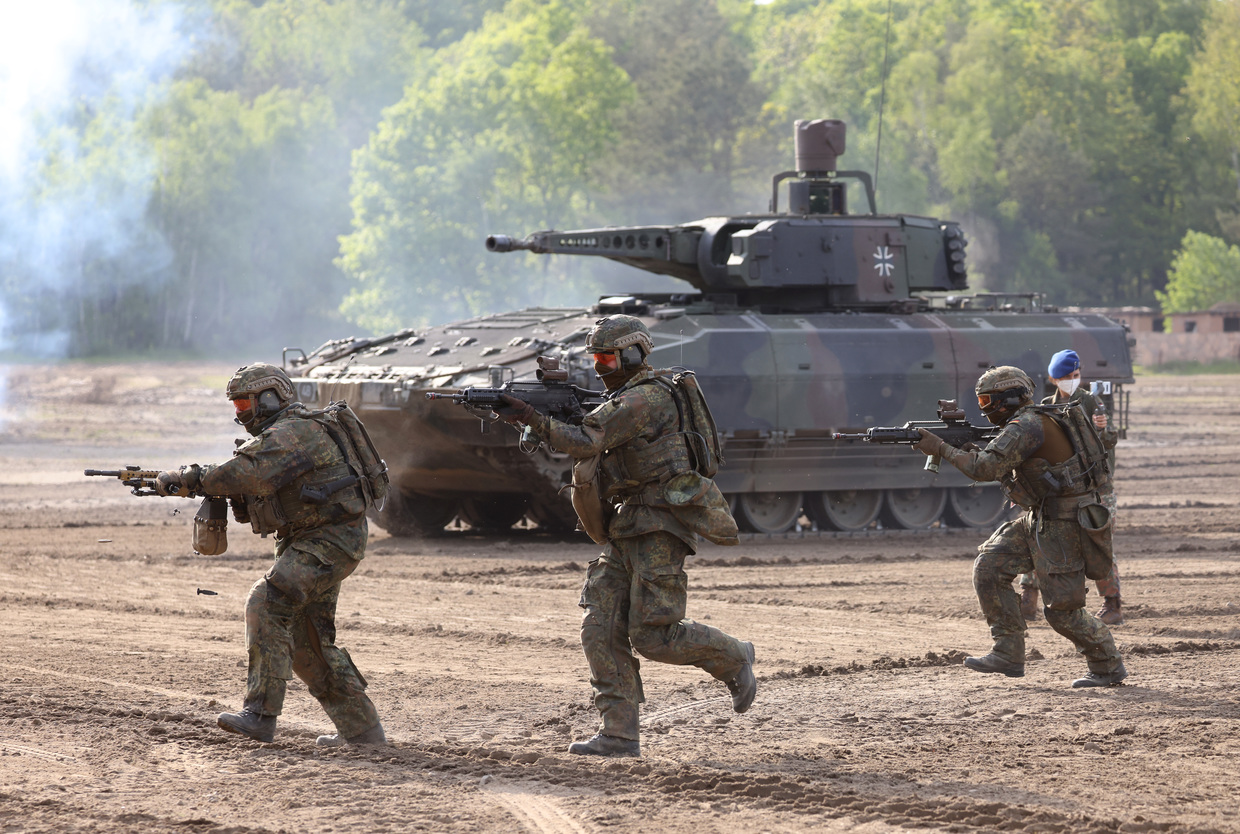
According to Suslov, there are two sides to this dispute. One side (including Great Britain, Poland and the Baltic states) insists on confrontation, while the other (including Germany, France and Italy) favors negotiation.
The recent incident with Germany denying entry to its airspace to the UK overflights delivering weapon systems to Ukraine is a good example of how far such differences might go. The UK aircraft ended up flying around Germany, spending more time and money. Even though later the authorities denied it to be an issue at all, it’s hard to believe there’s smoke without fire.
In an interview to The Washington Post, Chair of the Defense Committee in Britain’s Parliament Tobias Ellwood said, “To avoid a confrontation, to avoid embarrassing Germany we haven’t formally requested overflights,” adding, “Russia notices all these things, and my concern is that it will egg them on to push the envelope even further.”
Stop, or I’ll Shoot… Not
Another sign of internal discord was Germany’s refusal to let Estonia supply Ukraine with 122-millimeter D-30 howitzers. Unlike the US, Britain, Poland and other allies, the German government decided not to export deadly weapons directly. This was Berlin’s approach to the issue even before the latest crisis around Ukraine: in summer, ex-Chancellor Angela Merkel openly told Ukrainian President Zelensky that she would continue blocking weapons supplies through NATO.
German officials formally explain this practice with reference to the old policy of not supplying weapons to countries involved in armed conflicts, which was enacted after the country’s defeat in World War 2. Berlin also opposes US calls to expand the upcoming package to include sanctions against the Nord Stream 2 pipeline and measures to cut Russia off from the SWIFT payment system. The United States is arguing that its European partners could always find alternatives to Russian gas, for example by negotiating a deal with the Gulf countries or with Australia, but Germany insists that the energy sector needs to be excused from sanctions.
Germany’s stance on the sanctions has already drawn sharp criticism, particularly from the UK, Poland and Estonia. The United States took the most offense: the WSJ even publishing an article titled “Is Germany a reliable American ally? Nein” and scolding the German government for inaction.
Kiev, which is counting on broad Western support, is no less upset. The Minister of Foreign Affairs Dmytro Kuleba went so far as to say that the German politicians’ actions were “disappointing.” “The German partners must stop undermining unity with such words and actions and encouraging Vladimir Putin to launch a new attack on Ukraine,” he said.
Differences with Washington and the resulting pressure have already brought unpleasant consequences for Berlin itself: the German government is now divided on the issue of what should be the correct response to the Ukrainian crisis. While Chancellor Olaf Scholz insists that Nord Stream 2 should not be made a political issue, Foreign Minister Annalena Baerbock tends to agree with her American colleagues, even though in practice she has to abide by Scholz’s decisions. In her interviews, she is asked why she holds a progressive view and the chancellor does not.
The conflict has already come into its own existence and will not disappear if the Ukrainian crisis is resolved, no matter how. It will remain as a hidden wound that constantly reminds of itself, threatening the unity of the coalition government formed by the Social Democrats, Greens and Free Democrats. The only way to avoid this rift would be to prevent a war from breaking out, which means Germany certainly does not need a bloodbath.
You Go Today, I’ll Go Tomorrow
Paris seconds Berlin’s call for diplomatic settlement. On January 25, 2022, Chancellor Scholz discussed this issue personally with President Macron, and both leaders agreed that sanctioning Moscow should be the measure of last resort and that the Kremlin’s request for negotiations shouldn’t be denied, especially since Russia is part of a number of international mechanisms, including the Normandy Format talks.
However, some see it as a sign of weakness rather than a triumph of diplomacy: one Politico source said that some of the German-French ideas were not acceptable for some countries in Central and Eastern Europe. In particular, the proposed idea of a potential summit between Putin and EU leaders came as a shock to many diplomats and officials, who rather think that Ukraine must be “saved” by means of sending lots of troops against Russia or axing Russia’s access to whatever international systems they can as a preventive measure.
The Guardian hurried to offer an explanation, saying that France simply didn’t see any signs of a planned invasion. If Emmanuel Macron said so publicly, he’d go against NATO and the US, but he is clearly in no hurry to do so. Thus, officially, France is on board with the sanctions plan, and President Marcon can be heard saying, quite officially, “Very clearly, today one can only observe that Russia is becoming a disruptive power.”

Some analysts and experts, including former French intelligence officer Eric Denese, believe that Paris is better off leaving NATO than sacrificing its interests by getting involved in someone else’s war.
A Bleeding Heart
Unlike Berlin and Paris, who seem to be diplomatically inclined, London, along with its partners from the Baltics and Warsaw – who would also prefer to deal a blow to Moscow instead of engaging in dialogue – is preparing to “deliver a severe and immediate blow” to the Russian economy. “We in the UK will not hesitate to toughen our national sanctions against Russia in response to whatever President Putin may do,” said UK Prime Minister Boris Johnson, commenting on the sanctions package which has already been prepared.
The United Kingdom currently heads a 1,200-strong force in Estonia, comprising 830 British and over 300 French military personnel. One hundred and forty British military engineers are stationed in Poland, and about a hundred military experts are in Ukraine. London is reluctant to send its military forces to the Russian-Ukrainian border but plans to increase its numbers in Estonia to 1,800, send additional defensive weaponry, and provide military support to other NATO members.
Real champions of Ukraine can probably be found in Britain, where Foreign Secretary Liz Truss has openly criticized Germany for its dependence on Russian energy resources, and caused an uproar by threatening sanctions against Russian banks, energy companies and oligarchs “close to Putin.”
It is clearly not the best idea to go to war with your supplier, and Britain boasts the smallest gas reserves among West European countries. However, according to The Times, London may seriously reconsider its independence after introducing anti-Russian sanctions: some fear it will be painful for Britain due to the loss of Russian “money flooding into London.” But why do the British play this game if it doesn’t do them any good?
Suslov says that the worse a domestic political crisis is, the more it affects foreign policy and the harsher the foreign policy rhetoric becomes. “When governments are facing domestic political crises, they are forced to take a hardline approach, and their avenues for compromise are drastically reduced. It also works the other way round: a government will take a hard line on foreign affairs in order to score political points at home,” he said.
Britain’s government is really going through a bad time because of the scandals around Boris Johnson. According to media reports, the prime minister hosted parties at his residence during the strict lockdown of May 2020, effectively breaking the law. Although the police investigation is still ongoing, part of the British public considers his guilt proven and demands his resignation. Johnson himself is asking the public to wait for the results of the investigation and to focus on the “more important issue” of the Ukraine crisis, but the partying scandal is attracting national attention. The hosts of political shows somehow manage to switch topics from the impending escalation in Ukraine to questions about the prime minister’s possible resignation.
A Catch
What seemed to be advantages – the willingness to stand united in defense of Ukraine and to issue public threats against Russia – eventually turned into disadvantages. The front turns out not to be so united after all, because national interests, as a rule, prevail. The sanctions, which have not even been introduced yet, are already affecting the welfare of common people across Europe, and in Russia itself. Even though Moscow is not threatening to cut off supplies, mere statements from Brussels are enough to cause issues with gas, and NATO’s threats are enough to prompt jitters in the Russian securities market and precipitate a fall of the ruble.
Western Europe can hardly benefit from the current escalation at all, Suslov stresses. “The current escalation shows the EU’s lack of agency in security and geopolitics. The greater the escalation between Russia and the United States, the greater the risk of military escalation in Ukraine, and the less important Europe becomes,” he said.
To conclude, let’s imagine a situation: The EU and the United States decide to wage a war for peace in Europe. But there is a catch: only one side is fighting this war. Unconnected with Europe geographically or politically, indifferent to Johnson’s drinking binges or whether the people of Munich feel warm in December, it is only bound to the region by one thing: the old security alliance, which is supposed to guard Europe like a watchdog. But if the dog is off the leash and the owners are fighting amongst themselves, who will guard the house?
